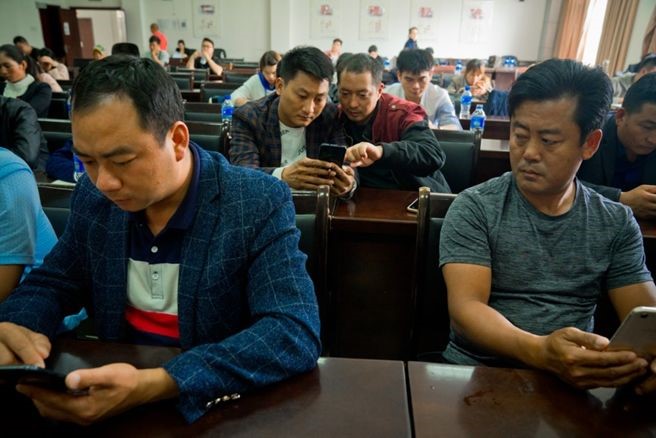Back in 2018, Pinduoduo sent shock waves through the investor community when it raised $1.6 billion from a Nasdaq listing as a three-year-old company. Online shoppers in China were excited to see its rise as an alternative to long-time market dominators Alibaba and JD.com.
But the startup founded by former Google engineer Colin Huang has ambitions well beyond e-commerce. It’s answering the Chinese government’s call to modernize the country’s agriculture and bolster the rural economy.
Life in China has become highly digital in many facets, from retail and entertainment to education and healthcare. But agriculture remains an exception. A McKinsey report from late 2017 showed that agriculture was among the least digitized industries in China. Pinduoduo saw an opportunity in the gap and started life by selling fruits online. Over time it has grown into a comprehensive e-commerce platform rivaling Alibaba, but agriculture “has always been close to the heart of Pinduoduo since its inception,” said Pinduoduo’s senior vice president Andre Zhu.
“Investing in smart agriculture is an extension of what we do and guided by our goal of promoting digital inclusion.”
Instead of a standalone department, the firm’s agricultural endeavor is a company- and even society-wide effort. Its strategy and investment team takes the lead to identify solutions targeting all stages of agriculture that the company can help scale up. At the implementation stage, the team might then tap its operational colleagues for contacts at various local governments and traditional farms that want to try the technologies.
“At least on the downstream distribution side, on e-commerce marketplaces for agricultural products, I would say we are relatively ahead compared to the rest of the world,” Xin Yi Lim, executive director of sustainability and agriculture impact at Pinduoduo, told TechCrunch in an interview.
In 2019, nearly 600,000 merchants sold farm produce through Pinduoduo. That translated to some 12 million farmers who supplied their fruits and vegetables to the merchants. In August, Pinduoduo pledged to sell $145 billion worth of farm produce annually by 2025. The number was $21 billion in 2019.
“But it’s really the upstream portion that we’re hoping to encourage and drive further investment in,” Lim added.
As such, the e-commerce giant has been traveling up the agricultural lifecycle, from building logistics infrastructure for distribution to equipping farmers with marketing know-how. In 2019, it trained close to 500,000 farm operators through its online e-commerce business institute.

Farmers in Yunnan Province learn how to open and operate a store on Pinduoduo at the Duo Duo University. / Photo: Pinduoduo
When it comes to production, Pinduoduo is able to track purchase behavior from its hundreds of millions of buyers and tell farmers what they should plant and how much they should price their products, an approach in line with the firm’s larger direct-to-consumer strategy to cut traditional middlemen costs.
The e-commerce firm is also hoping to gather agronomic expertise for its farm suppliers. It kickstarted a smart farming competition this year, calling teams from around the world to grow strawberries using artificial intelligence and connected devices. They were graded on criteria such as the fruit’s sweetness, energy and fertilizer use, and their AI strategy. The winner’s design would then be rolled out at one of the AI-powered Duo Duo Farms, a project jointly launched by Pinduoduo and the provincial government of Yunnan to let farmers sell directly on the e-commerce platform.
These examples are just the tip of the iceberg of Pinduoduo’s agricultural long game. The firm doesn’t disclose exactly how much it plans to invest in the field, though Lim said “compared to some of the other players in the industry, our involvement in agriculture is definitely more comprehensive.”
The company looks for investment opportunities outside China as well. While domestic players come with more affordable hardware applications, especially drones and sensors, more mature solutions around crop modeling and prediction are found in Western countries where large commercial farms prevail, Lim noted.
Agritech adoption among Pinduoduo farmers is still “relatively small” because the firm’s smart farming initiative is in the early stage. But the e-commerce upstart might be well-positioned to drive the development of agritech in China.
Different from the U.S. and Australia, China is dominated by small-scale farms that often can’t afford to buy advanced farming equipment. Lacking demand, agritech startups have had difficulty fundraising to subsequently invest in customer acquisition and lowering their price point, Lim explained.
“Pinduoduo can already connect [agritech startups] with a wide pool of potential customers. I think that helps to ease a little bit of the initial pain point,” said Lim.
Finally, injecting technologies into farming could help retain talent in China’s vast rural hinterland, which is losing young labor to bigger, more affluent cities.
“In the long term, we [could] make farming more efficient and easier. There could potentially be a transformation in the whole structure of the farming industry. We could see young people feel that ‘I can actually be an entrepreneur. There are these tools that can give me more control over the output,'” Lim suggested.
“There are potentially people who today are not farmers who could then start to see farming as a viable alternative.”
source https://techcrunch.com/2020/12/16/pinduoduo-agritech/


0 Comments